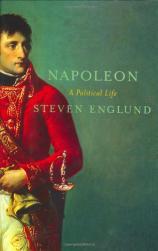Napoleon: A Political Life
Review
Napoleon: A Political Life
It is said that the literature on Napoleon Bonaparte is rivaled in
size only by those dealing with Christ, Lincoln and Beethoven. And
in all four cases the flood continues, with no sign of
abatement.
This latest contribution to Napoleonic studies is a massively
documented study of the man himself, but perhaps more searchingly
of the motives that drove him, the means he used to gain his ends
and the times that he dominated so thoroughly. Steven Englund
repeatedly compares the Corsican warrior on all these points to
Charlemagne and Frederick the Great, but his most frequent
reference point is Julius Caesar.
Englund attempts no single set-piece portrait of Napoleon the man,
but one emerges anyway through the book's complex web of quotations
from Napoleon's conversations and writings, appraisals by his
friends and enemies and the judgments of historians who have tried
to take his measure over the 200-plus years since he burst on the
world stage in the last years of the eighteenth century.
Englund, who has lived and taught in France for many years,
indulges his lifelong fascination with his subject (he dates it
back to his junior high school years in Los Angeles), and goes at
his task with what one can only describe as unflagging, almost
obsessive zeal. His book is a staggering feat of historical
scholarship, but one that will appeal more to other scholars than
to the general reader. It is exhaustive, it is thorough --- but it
is not a consistently easy book to read.
Napoleon Bonaparte emerged from military schools in France to
become a full general at the age of 24. There were brilliant
tactical maneuvers in France, Italy and Egypt early in his career,
which played out against the confused aftermath of the French
Revolution. Englund sees him as a "born autodidact," a man who
simply seized opportunities as they arose and converted them into
brilliant personal triumphs. He was not, in the author's view, a
man who hewed to any systematic "line" of party adherence or
military doctrine. Englund's best summing-up: "Napoleon Bonaparte
was a self-made man, and he worshipped his
creator." He wished "to be free to do what he liked --- but
'legally.'"
In 1799 Napoleon and two other men took over the reins of
government, replacing the ineffectual five-man Directory of the
time. Before long Napoleon was "First Consul," then "Consul for
Life" and, in 1804, "Emperor" (he crowned himself in an elaborate
ceremony while the Pope, who was present, looked on). He was deeply
concerned to establish his "legitimacy" as ruler, a concept that
Englund worries over like a dog gnawing at a bone. This illustrates
Englund's habit of pausing in his narrative to explore at length
anstractions like "nation" and "glory." When these sidetrips come
along --- and there are a number of them --- the narrative grinds
to a halt while the historian does his "historianly" thing. One is
tempted to say that if Englund were not so good a historian, he
might be a better writer.
All the great Napoleonic battles get their due in this book --
Lodi, Austerlitz, Marengo, Waterloo --- but they are not at the
center of Englund's story. That center is always Napoleon as shaper
of his times, as a brilliant and erratic man, a loose cannon, but
certainly a powerful one whose roar still echoes down the
ages.
When the tide turns against Napoleon, with the famous retreat from
Moscow in 1812, the book's pace quickens markedly. The last nine
years of Napoleon's life --- deposition from power, exile on Elba,
return for the "hundred days," final exile on St. Helena --- are
disposed of with rather less historical hairsplitting. And Englund
demolishes the idea that Napoleon was somehow a precursor of Hitler
and Stalin. Then he ends with a cogent summary of Napoleon's
enduring influence down to the present day.
This book is a searching and serious examination, carried out with
incredible diligence. It will, however, appeal more to Englund's
historian peers than to the general reading public.
Reviewed by Robert Finn on January 22, 2011
Napoleon: A Political Life
- Publication Date: January 6, 2004
- Genres: Biography, Nonfiction
- Hardcover: 592 pages
- Publisher: Scribner
- ISBN-10: 0684871424
- ISBN-13: 9780684871424




